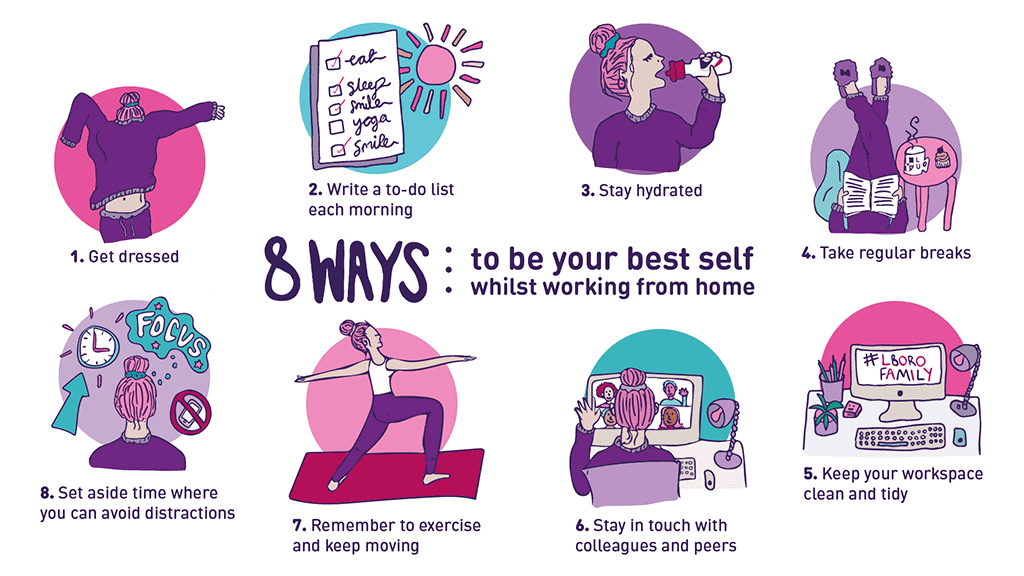Eight ways to perform at your best whilst working or studying

For many of us, it’s been a big transition adjusting to working or studying from home as opposed to being based on campus using the University’s facilities.
Here are eight top tips to help you succeed at home and stay on track to perform at your best.
1. Get dressed
It may sound like an obvious task to some, but making sure you get dressed each morning can prepare you for the day ahead. As tempting as it might be to sit in your pyjamas all day, changing into an outfit will not only improve your state of mind, but you’ll be psychologically prepared to start working or studying too.
You don’t necessarily have to wear smart clothes, do what feels comfortable for you. Once you’ve finished working or revising, you can change back into casual clothes so your brain understands this is your time to relax.
2. Write a to-do list each morning
Stay on track with the tasks ahead of you by writing a daily to-do list. This will help to keep you organised and motivated, and you’ll also feel a real sense of achievement as you manage to cross your tasks off.
Keep it realistic so you don’t get disheartened, and try to tackle the hardest things first. Another top tip is if you know you can complete a task in five minutes, get it done there and then.
3. Stay hydrated
Make sure you keep drinking plenty of fluids whilst you’re at home. Aim to drink around two litres per day, and this can include water, tea, coffee, milk or squash (with no added sugar). You may need to consume more than this depending on factors such as the level of exercise you undertake or your diet.
Try to avoid having too many sugary drinks such as fizzy pop and fruit juice, and find a healthy balance when consuming caffeine.
Staying hydrated keeps your digestive system functioning, controls your temperature, and reduces fatigue, amongst many other benefits.
4. Take regular breaks
Maintain your concentration levels by having regular breaks. Our bodies aren’t meant to sit in the same position in front of a computer all day. Your work or study space at home may not be as ideal as what you are used to at the University, meaning you’re more likely to need to take a break.
Following the Pomodoro Technique is one way of ensuring you take breaks throughout the day: break your day into 25- or 55-minute chunks with five-minute breaks, giving you time to stretch, move around and readjust your posture.
5. Keep your workspace tidy
Avoid distractions by maintaining a clear space for you to revise or work. Having a cluttered space can contribute to us feeling more stressed, whereas keeping the area organised can help you find things quickly and efficiently.
Some people may find additional items such as a photo of their loved ones or a motivational quote helps them to stay productive too.
6. Check in with your colleagues or peers
Don’t forget to speak to your colleagues or friends from your degree course. Organise a video meeting or Facetime session, or pick up the phone. Social isolation can make many people feel lonely and for some, they may be the only ones living in their home, so staying in touch can avoid feelings of loneliness or a low mood.
Why not host a virtual revision session with others on your course, or set up a ten-minute video catch up each morning to check how everyone in your team is doing?
7. Remember to exercise and keep moving
Utilise your free time to exercise. You can do this by walking, running or cycling outdoors on your lunch break or before or after you start work. Alternatively, there are plenty of free home workouts available on the internet. Below are just a few examples:
- Loughborough Sport has launched a new website offering a range of workouts suitable for all levels, as well as challenges and competitions to help keep you active during lockdown.
- NHS Move More 10-minute home workouts – includes stretching, cardio and strength sessions
- P.E. with Joe Wicks – available every morning from 9am and suitable for all of the family
8. Set aside time where you can avoid any distractions
Try to dedicate at least an hour each day where you can avoid being interrupted. Many members of the Loughborough Family will have children at home, and some students may be adapting to living back home with their parents, and it can be difficult to not be easily distracted from your studies or tasks.
A study by the University of California found that on average after an interruption it can take us 25 minutes to return and refocus to the original task.
If you don’t have an office, try to set up a room in the house where you can communicate clearly with other members of the household that they should avoid disturbing you unless necessary.
Health and Wellbeing
Wellbeing means being in a positive physical, social and mental state. Wellbeing is important to us as happy, healthy people who achieve harmony in their work / life mix are more creative, productive and help to create a great place to work.